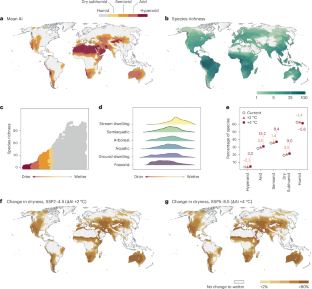Global exposure risk of frogs to increasing environmental dryness
IF 27.1
1区 地球科学
Q1 ENVIRONMENTAL SCIENCES
引用次数: 0
Abstract
Compared with the risks associated with climate warming and extremes, the risks of climate-induced drying to animal species remain understudied. This is particularly true for water-sensitive groups, such as anurans (frogs and toads), whose long-term survival must be considered in the context of both environmental changes and species sensitivity. Here, we mapped global areas where anurans will face increasing water limitations, analysed ecotype sensitivity to water loss and modelled behavioural activity impacts under future climate change scenarios. Predictions indicate that 6.6–33.6% of anuran habitats will become arid like by 2080–2100, with 15.4–36.1% exposed to worsening drought, under an intermediate- and high-emission scenario, respectively. Arid conditions are expected to double water loss rates, and combined drought and warming will double reductions in anuran activity compared with warming impacts alone by 2080–2100. These findings underscore the pervasive synergistic threat of warming and environmental drying to anurans. The authors consider the future risks of warming and drying to water-sensitive anuran species. They show that increased aridity of anuran habitats and drought exposure under climate change, combined with warming, can substantially reduce anuran activity.


全球青蛙暴露于日益干燥环境的风险
与气候变暖和极端气候相关的风险相比,气候引起的干燥对动物物种造成的风险仍未得到充分研究。对水敏感的类群尤其如此,如无尾类(青蛙和蟾蜍),它们的长期生存必须同时考虑环境变化和物种敏感性。在这里,我们绘制了无尾类动物将面临越来越多水资源限制的全球区域图,分析了生态型对水分流失的敏感性,并模拟了未来气候变化情景下行为活动的影响。预测表明,在中度和高度排放情景下,到2080-2100年,6.6%-33.6%的无尾类栖息地将变得干旱,15.4%-36.1%的栖息地将面临日益恶化的干旱。干旱条件预计将使失水率增加一倍,到2080-2100年,干旱和气候变暖将使无尾类动物的活动比单独受气候变暖影响时减少一倍。这些发现强调了气候变暖和环境干燥对无尾类的普遍协同威胁。
本文章由计算机程序翻译,如有差异,请以英文原文为准。
求助全文
约1分钟内获得全文
求助全文
来源期刊

Nature Climate Change
ENVIRONMENTAL SCIENCES-METEOROLOGY & ATMOSPHERIC SCIENCES
CiteScore
40.30
自引率
1.60%
发文量
267
审稿时长
4-8 weeks
期刊介绍:
Nature Climate Change is dedicated to addressing the scientific challenge of understanding Earth's changing climate and its societal implications. As a monthly journal, it publishes significant and cutting-edge research on the nature, causes, and impacts of global climate change, as well as its implications for the economy, policy, and the world at large.
The journal publishes original research spanning the natural and social sciences, synthesizing interdisciplinary research to provide a comprehensive understanding of climate change. It upholds the high standards set by all Nature-branded journals, ensuring top-tier original research through a fair and rigorous review process, broad readership access, high standards of copy editing and production, rapid publication, and independence from academic societies and other vested interests.
Nature Climate Change serves as a platform for discussion among experts, publishing opinion, analysis, and review articles. It also features Research Highlights to highlight important developments in the field and original reporting from renowned science journalists in the form of feature articles.
Topics covered in the journal include adaptation, atmospheric science, ecology, economics, energy, impacts and vulnerability, mitigation, oceanography, policy, sociology, and sustainability, among others.
 求助内容:
求助内容: 应助结果提醒方式:
应助结果提醒方式:


